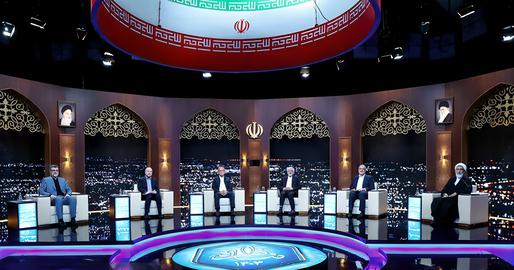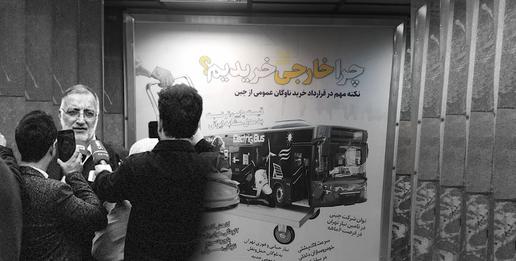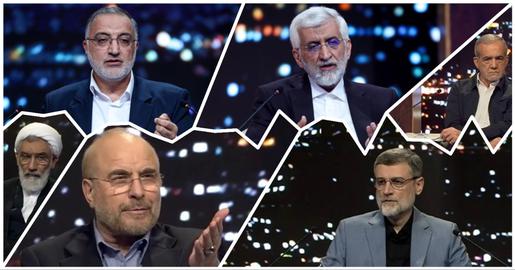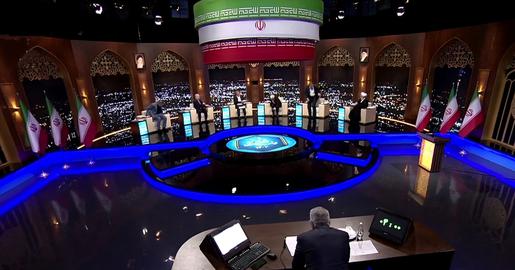Elections in the Islamic Republic have never been free and fair, but they can still be fiercely competitive. Hence, the televised debates, which started airing in 2009, can often make for good TV.
To get ahead in the race, candidates have frequently attacked each other's failings, unveiled the skeletons in each other's closets, and made scathing critiques of the status quo and those responsible for maintaining it.
But little of such excitement was on display on Monday as the six candidates competing for the presidency held the first of their five televised debates on the economy.
The debate, held with a lot of pomp and fanfare, ran for four hours. While the candidates went into some detail in discussing Iran's appalling inflation and lack of economic growth, they hardly made headline-worthy statements.
Of the six candidates, three have the most realistic chance of winning the June 28 polls: Mohammad Bagher Qalibaf, the conservative speaker of the parliament; Saeid Jalili, an ultra-hardliner and former national security advisor; and Masud Pezeshkian, the lone reformist allowed to run by the Guardian Council, the body that vets all candidates running for office.
Three other candidates include the hardliners Alireza Zakani, Tehran's mayor, and Amirhossein Qazizadeh Hahsemi, the only cabinet minister of late President Ebrahim Raisi allowed to run. Half a dozen others had their candidacies rejected by the Guardian Council.
Among these, Pezeshkian had the most to win from a televised debate. The physician and MP from Tabriz knows that his only real chance of winning is to bring out the majority who boycotted the presidential elections in 2021 and parliamentary polls in 2020 and 2024. This would require enthusing the voters by showing that he stands out from the five other candidates and will tackle the terrible status quo in the Islamic Republic.
But, as already seen in his interviews, Pezeshkian seems to have no intention of running such a campaign. In fact, if an outsider to Iranian politics listened to the interview, he or she might not have known that he represents a marginalized political current, supposedly in opposition to those currently holding power.
Quite to the contrary, Pezeshkian seems to be running on a platform of working honestly with others to better things while remaining loyal to the Islamic Republic and its Supreme Leader Ali Khamenei. Instead of running attacks on hardliners, he seemed to be urging everyone to get along. He might be banking on the fact that he has the cleanest hands as he criticized rampant corruption in the country, called for transparency, and for prosecuting those responsible for the country's economic woes.
But these are effectively apolitical points. This is a far cry from the ethos of the reformist movement, whose platform had long propagated the democratization of Iran and whose personalities have often emphasized such themes. In contrast, when Pezeshkian appeared in a student townhall at the University of Tehran a few days ago, he proudly told students of his deep devotion to Khamenei. When they asked him what he would do about political prisoners, he simply mentioned that this was out of the presidential purview.
Since the televised debate was dedicated to the economy, Pezeshkian could have tried airing some left-wing economic proposals just like former conservative president Mahmoud Ahmadinejad did during his first run in 2005.
As someone well-versed in religious scholarship, he could even have run as a left-Islamist. Instead, Pezeshkian stuck to the general economic consensus by promising that his "social justice" would not lead to "populist distributive policies." As he had done previously, he swore fealty to Iran's Seventh Development Plan, designed by the Raisi administration and passed last year in the conservative-dominated parliament headed by Qalibaf.
Some Pezeshkian supporters might see this as refreshing honesty on his part. In other words, he is not promising anything he knows he cannot deliver. This might be better than making grand promises that cannot be followed up on, as former centrist president Hassan Rouhani was sometimes accused of doing.
Ultimately, though, even core Pezeshkian supporters seem underwhelmed by his performance. No matter how honest, why would people vote for a reformist candidate who cannot bring about any reforms? In fact, this presents an identity crisis to the reformist movement, perhaps even worse than not being allowed to compete by the powers that be.
One of Pezeshkian's most thorough answers came in his final monologue. Reading from a note, with a shaking hand and quite a few unpresidential stumbles, Pezeshkian pledged to bring about a government of "honesty", "active cooperation with the world," and helping to lift internet restrictions, which, among other things, have hampered small businesses relying on popular apps such as Instagram. But it was a case of too little, too late.
Mostafa Pourmohammadi, a centrist conservative with a dark track record, showed a glimpse of how a more outspoken candidate could have captured space. As a prosecutor in the 1980s, he had a role in many crimes of the Islamic Republic, especially the 1988 mass executions of political prisoners.
Pourmohammadi has also served in high positions in the intelligence ministry for years before serving as Ahmadinejad's interior minister and later Rouhani's justice minister. As serving under Rouhani would suggest, the 64-year-old, who is the only cleric running, has been ensconced in the centrist camp of Iranian politics.
Many consider him the true winner of the debate since he was much more critical of the status quo than Pezeshkian and much more forthright in confronting his hardliner rivals. Pourmohammadi even went after the hot-button issue of Iran's military help for Russia during its invasion of Ukraine, claiming that Iran was not sowing the benefits of this costly move.
Shortly after the debate, Pourmohammadi published a new campaign video criticizing the harsh enforcement of mandatory Hijab on Iranian women. Pezeshkian has done or said nothing half as radical as yet.
Amongst the four other candidates, Qalibaf is the clear frontrunner. He might not have gained much from the debate, but he did not lose a point either, which helps when you are ahead. Well-known for his strongman tendencies, Qalibaf repeatedly used the catchphrase "strong manager" and "strong president," saying that only such qualities could pull Iran out of its dire straits.
He thus showed remarkable message discipline, aided also by his steely delivery. On several occasions, he attempted to neutralize Pezeshkian by agreeing with him on whether there was a need to counter the West-imposed sanctions or opposition to importing second-hand cars that plague the Iranian roads. Thus, Some might conclude that he will get the best ideas from both reformists and conservatives.
Qalibaf also boasted about his achievements as the mayor of Tehran from 2005 to 2017. Unlike other conservative candidates who downplay the sanctions, he repeatedly affirmed that they would need to be lifted through active diplomacy. Like most other candidates, he also promised to continue the drive for privatization.
As the only serious hardliner candidate, Jalili's performance was similar to his previous runs for the presidency, such as the one in 2013.
Long before Chat GPT was invented, Jalili had been talking in a robotic manner akin to a beta version of an LLM, with senseless repetition of some generic terms. Still, some of the points he made in the debate, such as the importance of working for Iran's rural residents and his visits to workers hurt by privatizations, might consolidate his base. However, they are unlikely to grow his votes by a significant amount.
The two minor hardliners provided a bit of comic relief. Despite his repeated attempts to pick a fight with other candidates, Zakani was mostly ignored by them. He started with an early gaffe when he couldn't remember what religious holiday (Eid) had just been celebrated. In a discussion on the importance of attracting foreign direct investment, he boasted about his recent trip to China and the deals he has made there.
He seemed oblivious that during these trips, Iran was spending its money to buy Chinese goods, which is quite the opposite of receiving FDI. His insistence that sanctions and Iran's placement on the Financial Action Task Force's blacklist do not matter appears laughable to those who know the dire situation of the Iranian economy precisely due to such reasons.
Qazizadeh Hashemi seemed more intent on defending the Raisi administration at any cost. He, Zakani, and Jalili also spent significant time attacking Rouhani and blaming most of the country's policies on the former president. This might be music to the ear of their base but will appeardishonest to many other voters.
The lackluster debate likely didn't move the needle on any of the numbers that matter: the overall turnout and the votes of any of the major candidates. As always with Iran, it is still hard to predict the result of June 28 with much certainty. But if one were to have a guess, Qalibaf appears to be in the lead—not because he won the debate but because he was careful not to lose it.
























comments